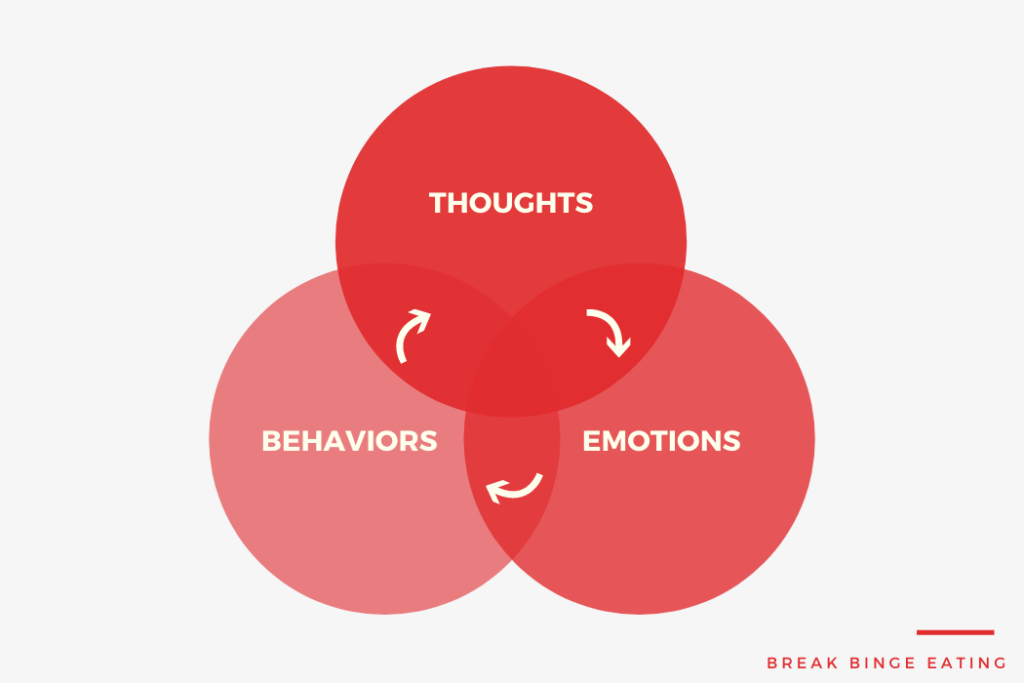Ever feel constantly hungry at night?
Worried about all the midnight snacking you’re doing?
Can’t stop eating late at night?
You’re not alone.
These behaviors resemble what we call “night eating syndrome”, also known as night eating disorders.
Night eating syndrome is becoming more and more common in the community, and especially among people with eating disorders and/or obesity.
But what exactly is Night Eating Syndrome?
Night Eating Syndrome is characterized by evening hyperphagia (i.e., consumption of > 25% of total daily food intake after dinner), morning anorexia, and insomnia with awakenings followed by nocturnal food ingestion 1Vander Wal, J. S. (2012). Night eating syndrome: a critical review of the literature. Clinical Psychology Review, 32(1), 49-59.
Despite how seemingly common this condition is, remarkably little attention has been devoted towards understanding, explaining, and treating it.
Let’s change that.
In this article, I’m going to touch on some of the things you’re interested in knowing about night eating syndrome.
Table of Contents
Clinical Features and Symptoms of Night Eating Syndrome
Before diving into some important facts and treatments for night eating syndrome, it’s always useful to first take a look at the clinical features and symptoms of this condition.
Here are the common clinical features and symptoms of night eating syndrome 2Vander Wal, J. S. (2012). Night eating syndrome: a critical review of the literature. Clinical Psychology Review, 32(1), 49-59.
- The daily pattern of eating demonstrates a significantly increased intake in the evening and/or night time, defined by more than 25% of food intake consumed after dinner.
- The person is aware or can recall the night eating episodes
- There is a lack of desire to eat in the morning
- The person usually skips breakfast most days
- There is a powerful urge to eat between dinner and sleep onset and/or during the night
- The person usually finds it very difficult to fall asleep or remain asleep
- There’s a strong belief that the person must eat in order to initiate or fall back asleep
- The person’s mood suffers or worsens in the evening
Night Eating Syndrome Isn’t A Sleep-Related Eating Disorder
As much as it sounds like it is, night eating syndrome isn’t a sleep-related eating disorder.

Let me explain why.
In a sleep-related eating disorder, the person eats without awareness – in other words, they don’t know that they’re eating because they’re asleep.
It’s almost like they’re sleepwalking.
In addition, a sleep-related eating disorder can be quite dangerous. There are reports that people who eat while asleep may find themselves eating non-food substances, like cigarettes or even pet food.
On the other hand, people with night eating syndrome are very much aware of their behaviour because they’re awake and conscious. They also choose when and what they’re going to eat 3Shoar, S., Naderan, M., Mahmoodzadeh, H., Shoar, N., & Lotfi, D. (2019). Night eating syndrome: a psychiatric disease, a sleep disorder, a delayed circadian eating rhythm, and/or a metabolic condition?. Expert review of endocrinology & metabolism, 14(5), 351-358.
Four Facts on Night Eating Syndrome
1. Night eating syndrome highly co-occurs with obesity
That’s right, people who are obese are much more likely to present with night eating syndrome than normal weight individuals.
In fact, 15% of morbidly obese adults are expected to display night eating syndrome, while as high as 42% of individuals seeking weight loss surgery experience night eating syndrome 4Adami, G. F., Meneghelli, A., & Scopinaro, N. (1999). Night eating and binge eating disorder in obese patients. International Journal of Eating Disorders, 25(3), 335–338.
It’s pretty straightforward on why there’s a strong relationship between the two.
Night eating syndrome leads to weight gain as a result of the excess (and at times enormous of) calories consumed at night.
Some people may even consume double their daily calorie requirements in one sitting during the middle of the night!
Over time, this buildup of excess calories quickly adds up.
2. Night eating syndrome closely resembles binge-eating disorder
The two conditions are highly related.
Previous research has shown that as high as 25% of people with binge-eating disorder also experience night eating syndrome 5Stunkard, A. J., Berkowtiz, R., Wadden, T., Tanrikut, C., Reiss, E., & Young, C. (1996). Binge eating disorder and the night eating syndrome. International Journal of Obesity, 20(1), 1–6.
The underlying thoughts, behaviours, and emotions experienced between night eating syndrome and binge-eating disorder are highly similar.
Some examples of the features common to night eating syndrome and binge-eating disorder include:
- Preoccupation around food and eating
- Eating a large amount of food in a short period of time
- Regular experiences of loss of control eating
- Debilitating shame associated with the eating episodes
- Going to great lengths to hide their eating
3. Night eating syndrome is debilitating
This mightn’t come as a surprise to many, but night eating syndrome can take a toll on a person’s wellbeing.
People with night eating syndrome experience more depression and anxiety, lower self-esteem, poorer quality of life, and greater psychological distress than people without night eating syndrome.
Nearly 15% of psychiatric outpatients with severe mental disabilities experience night eating syndrome 6Lundgren, J. D., Allison, K. C., Crow, S., O’Reardon, J. P., Berg, K. C., Galbraith, J., et al. (2006). Prevalence of the night eating syndrome in a psychiatric population. American Journal of Psychiatry, 163(1), 156–158.
Unfortunately, whether these mental health problems are a cause or consequence of night eating syndrome is yet to be determined.
I suspect there’s a bidirectional relationship.
4. Night eating syndrome can be treated effectively
Although treatment approaches for night eating syndrome have been far less studied than treatment approaches for other eating disorders, we do have a decent idea on what can be effective.
Certain antidepressant medications, like sertraline (Zoloft) and escitalopram (Lexapro), have been shown to be highly effective.
Among people with night eating syndrome, sertraline and escitalopram have reduced night time awakenings (from 2 per night to 0.2 on average), night eating episodes (from 1.5 to 0.5 on average), and post evening caloric intake (from 52% of daily intake to 25%)7O’Reardon, J. P., Stunkard, A. J., & Allison, K. C. (2004). Clinical trial of sertraline in the treatment of night eating syndrome. International Journal of Eating Disorders, 35(1), 16–26.
Further to this, 80% of people have been shown to recover from night eating syndrome after using Escitalopram8Vander Wal, J. S., Gang, C. H., Griffing, G. T., & Gadde, K. M. (2012). Escitalopram for treatment of night eating syndrome: A 12-week, randomized, placebo-controlled trial. Journal of Clinical Psychpharmacology.
Cognitive-behavioral therapy (CBT) has also been shown to be effective for night eating syndrome, although to a lesser extent than antidepressants..
CBT is a treatment that aims to normalize eating behavior and correct any faulty thoughts, beliefs, or assumptions one has towards food and eating.

CBT for night eating syndrome has been shown to decrease caloric intake after dinner (35% total to 24%), number of night time eating episodes (9 to 2.6 per week), and even body weight (83kg to 79kg)9Allison, K. C., Lundgren, J. D., Moore, R. H., O’reardon, J. P., & Stunkard, A. J. (2010). Cognitive behavior therapy for night eating syndrome: a pilot study. American Journal of Psychotherapy, 64(1), 91-106.
5 Simple Strategies to Stop Night-Time Eating
How do we stop night eating syndrome?
It’s the million dollar question.
Let’s get stuck into five effective self-help strategies designed to help you stop the midnight snacking and binge eating at night.
1. Monitor Your eating patterns
Self-monitoring is a core component of CBT that involves in-the-moment recording of relevant thoughts, feelings, and behaviors related to eating.
Part of the reason why you might always be hungry at night or can’t stop eating in the middle of the night is because you’re unfamiliar with your (probably unhealthy) daily eating patterns.
In order to change your night eating behaviors, the first thing you need to do is observe, analyze, and become fully aware of your eating patterns.
By this I mean knowing what you eat, when you eat, how much you eat, what you were thinking at the time, what you feeling at the time, and your level of hunger before, during, and after the eating episode.
Documenting all of this information will go a long way towards helping you identify any patterns and in understanding why you’re constantly eating at night.
2. No more skipping meals
The vast majority of night eaters don’t eat very much during the day.
This needs to change.
A big part of why you’re eating most of your calories at night is probably due to the fact that you’re starving come evening time.
Your body is craving food.
It’s been deprived all day.
You have to ensure that you balance the ledger – spread your calories out throughout your entire day.
This may seem obvious, but you’ll be surprised to know that night eaters don’t actually recognize this.
So, you need to adopt a pattern of regular eating.
This means eating 3-4 snacks and 3 meals a day, no more than 3 hours apart.
The volume and calorie content across the meals and the across the snacks should be roughly similar.
So, each night, write down the exact times you’re going to eat your meals and snacks. Make sure to stick to these times, too.
Consider this quick and easy regular eating plan:
- 7am: Breakfast
- 10am: Mid-morning snack
- 1pm: lunch
- 4pm: afternoon snack
- 7pm: dinner
- 10pm: desert
You might be thinking to yourself that you’re not going to be hungry in the morning.
This doesn’t matter.
In order to stop eating in the middle of the night, you will need to stick to this normal eating schedule so that your body retrains itself to eat healthily again.
3. The bedroom is off-limits
Don’t worry – I don’t mean that you can’t sleep in your bedroom.
Rather, if you want to stop binge eating at night, then you have to completely stop eating in the bedroom.
Permanently.
It’s likely that a lot of your night eating episodes are happening alone in the bedroom.
This is a real problem, because now the bedroom has become a conditioned stimulus.
In other words, whenever you go into your bedroom, the hunger signals in your brain will “light up”, and you’ll feel compelled to eat.
You need to apply basic classical conditioning principles.
The extinction principle, in fact.
Extinction means that you completely prevent the conditioned response (eating) from occuring whenever you encounter the condition stimulus (bedroom).
So, with enough repetition of this extinction principle (i.e., not eating in the bedroom), you’ll no longer feel hungry, compelled to eat, and obsess around food whenever you step foot into your bedroom.
As a consequence, the quality of your sleep should improve.
4. Implement relaxation strategies
There’s no doubt you’ll experience another urge to eat during the night.
You need to remember that urges come and go.
Like a wave, actually.
You just need to prevent the urge from getting the better of you or acting on it.
What better way to do that is through relaxation exercises.
Relaxation exercises, like mindfulness meditation and progressive muscle relaxation, prevent you from acting immediately on an urge.
This is because it helps you to step back, observe your thoughts in a nonjudgmental fashion, and realize that you need not give into an impulse that serves no useful function.
By focusing all your attention towards the relaxation task, you’ll quickly realize that the urge decreases substantially in intensity.
And, over time, the urge will essentially become non-existent.
A distant memory.
You’ll also be so relaxed that your sleep quality and quantity will improve too.
There are plenty of free apps to download that will help you with these relaxation exercises.
5. Be Active
Engaging in regular exercise is also necessary for addressing night eating syndrome.
Any exercise is good – it doesn’t have to be the high intensity stuff.
Exercise is beneficial for night eating syndrome because of the positive effects it has on sleep.
We know that regular exercise does wonders for our sleeping patterns, including enriching the quality and quantity of our sleep.
And we also know that people with night eating syndrome are notoriously poor sleepers.
In fact, a huge reason why people eat so much at night is because they can’t initiate or sustain any sleep.
So, you need to find methods that increase the likelihood of better sleep, and one of the better evidence-based techniques to achieve this is regular exercise.
I’d suggest engaging in at least 30 minutes of exercise daily, and slowly increasing this over time.
References

Dr Jake, this is very clear and logical advice. Thank you. I am going to put something near my bed at night to remind me to meditate when I awaken rather than making my way to the refrigerator. And I am going to exercise. Thank you, Lucia
I am very glad that you found this useful, Lucia.
I would love to hear how things have gone since implementing these strategies.
Best of luck.
This is a great article! Very pragmatic and useful, and backed by evidence.
Thank you, Assumpta. I really appreciate the feedback.
My night eating has gotten really bad lately. I’ll wake up binge and then crash on the couch. It’s almost every night. I need to make another gameplan to stop it. This article is a great outline for that. I really appreciate how your response wasn’t just to take antidepressants.
Thank you for the positive feedback Daniel!
Hi! Thank you for your article. It is helpful. I am suffering and have tried many things over the last 20+ years. My doctor prescribed Topamax and it has helped me unbelievably. I haven’t eaten since I’ve started this med 6 weeks ago.
And I’ve been waking 3x a night for all my life since im a kid.(I’m 38).
I’m hopeful this will last.
Just thought I’d share so others can benefit too.
Thank you for sharing this. I am pleased to hear that you’ve found something helpful. I do hope that others can benefit from this too.
Hi mate,
Thanks a lot for sharing this content. For me the most valuable info here is to become more aware of my eating patterns through journaling and also incorporating a relaxation technique to substitute the impulse to binge in the evenings. Personally I have tried and tested, meditation, body scans and journaling which certainly help bring about awareness of thoughts/feelings and emotions related to the behaviour of binge eating but still the conditioned behaviour overcomes these strategies. I’m someone who likes to think that I can get to the bottom of such issues through these CBT techniques and the idea of doing so, late in the evening when I’m tired is rather overwhelming and can often escalate the impulse behaviour to eat. This reflection itself has brought to my attention the unrealistic expectation I may hold to solve this issue in the single instance that often pre empts night eating behaviours and perhaps I need to be more realistic as to the timeframe i should give myself in order to achieve a healthier relationship with food. Did you have any suggestions or resources for this? Otherwise this article has made me reflect on perhaps using an activity like doing a puzzle to instead of techniques that focus more directly on the mind and body as a way to occupy my mind as I wind down. Anyway, just some reflections and some gratitude for the information you are sharing!